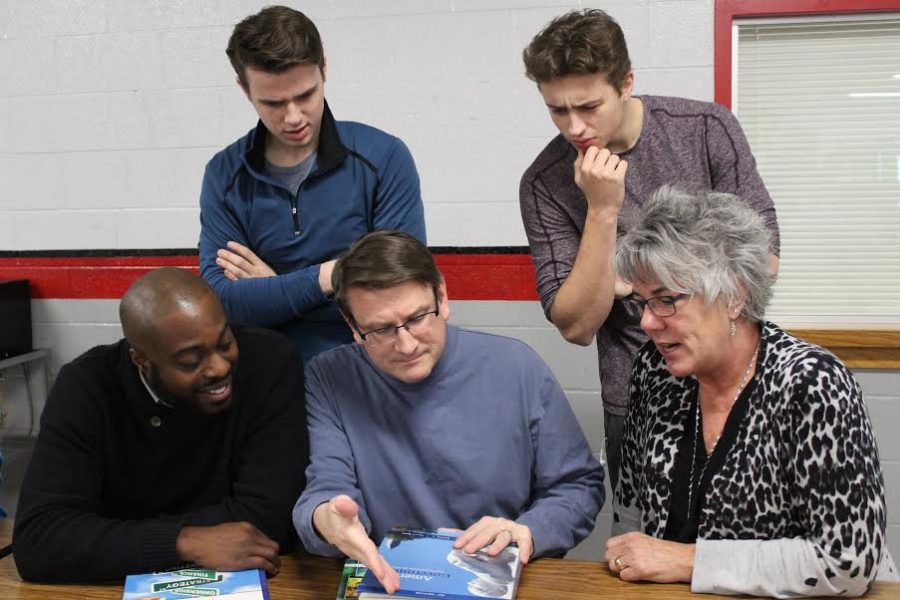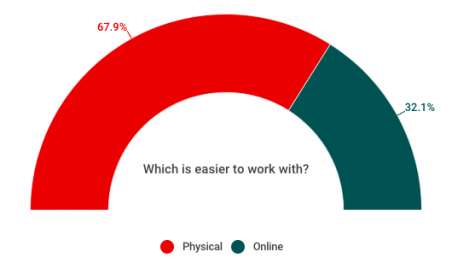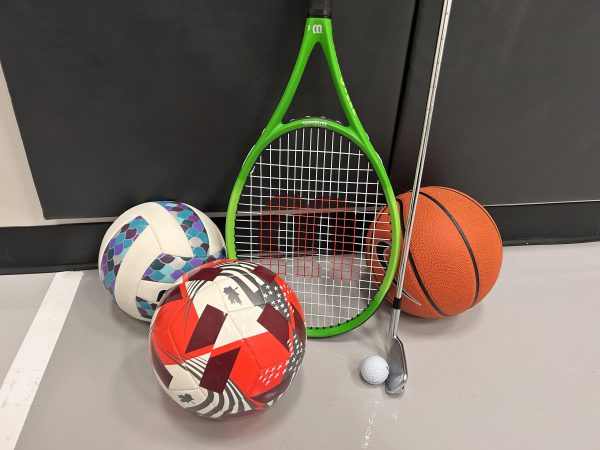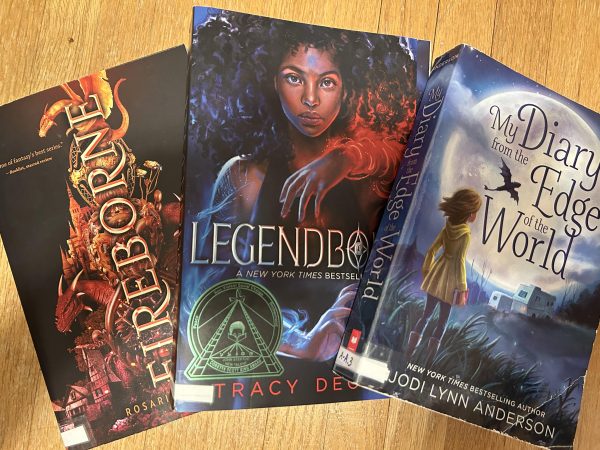The truth behind BSM textbooks
What classes need textbooks? How does BSM choose them? How are they paid for? Which, online or physical, is better?
BSM faculty and administration decide which textbook to use for each course.
Throughout the entirety of most BSM students’ educational careers, they’ll rarely, if ever, have to open a physical textbook––well, until senior year. BSM routinely boasts about using technology in the classroom, on how amazing it is to have online textbooks, and on how much lighter a student’s backpack becomes. However, when students reach senior year, a plethora of physical textbooks suddenly materialize, being used in AP Euro, AP Gov, AP Calculus, Forensics, Physics, and more. For those taking most if not all of these classes, that’s a heavy course load.
How Does BSM Decide Which Classes Need a Textbook?
The choice of whether or not a course has a textbook is up to each individual department, and, often times, the specific teachers instructing the course. “For my Biomed class––which is a very hands on learning class, I don’t think a book would be that important,” science teacher Ms. Jennifer Roushar said.
However, to Roushar, chemistry is different. “For my chemistry class I think [textbooks are] more important for the example problems and for the online practice that can give you feedback right away,” Roushar said.
The language department has made the decision as a whole to find a quality textbook for each individual language class taught at BSM. “We have, in world language, textbooks for pretty much every language and every level. I think textbooks are more of an ancillary material at this point. A lot of teachers will use them more day to day,” Spanish Ms. Mary Murray said.
Social studies classes often rely on textbooks to teach concepts like taking notes. “In history classes, note taking skills are very important,” history teacher Ms. Cherie Vroman said.
We try to pick books that are above the level a little bit–all of the chemistry books are college level, the honors biology book that they just got here is college level.
— Ms. Jennifer Roushar
Textbooks also help teachers and students stay organized and on track with their lessons. “You need an organizing structure that the students can have in their hands when they aren’t in class so a textbook gives you a skeletal structure for the class. It isn’t the totality but at least it gives you an organizing principle.” Mr. Ken Pauly, social studies teacher at BSM, said.
“Textbooks are often written in a particular type of language and getting students to be able to understand physics which is challenging already, it helps me to come up with the language or notes,” BSM science teacher Mr. Tanner Stevens said.
How are Textbooks Chosen?
Once teachers decide that they’d like a textbook for their class, the next step is finding the right fit. Sometimes the textbooks that are currently used continue to work with teachers’ curriculums, but other times, teachers decide that a new book is needed. “I didn’t really like the old chemistry book. I didn’t like a lot of the practice problems and the book’s sequence of chapters. Plus it was a super, super popular one so kids could google answers for every single problem that was in that book. I wanted to go to a book that made more sense to me and aligned better with the order of the curriculum that I go in,” Roushar said.
The hunt for a new textbook is a thorough and often long process. “I went through the AP list, and I found the books that were AP approved, and then from there I went onto Amazon and previewed them. From there I could narrow it down–I didn’t like the order of some, I didn’t like how some worked. Then I got some copies from Pearson of the book I wanted, and I went through it and was like yeah this is the book I want,” Roushar said.
The process works similarly in the English department with introducing new texts, however, English teachers all decide together on whether or not a book is replaced. “If a teacher wants to introduce a new text to the curriculum, we often order sample copies and everyone takes turn reading it. Then, we discuss it as a department and determine whether or not it’s appropriate and for which course. We take a vote. That’s about it,” Ms. Katie Belanger, English teacher at BSM, said.
Most public schools have to audit and try out a bunch of books with their curriculum for a year before they get them picked. For us, it’s whatever we want usually. There are no requirements–whatever we want.
— Ms. Jennifer Roushar
The world language department, like the English department, meets together as a whole to make all textbook decisions. “We usually get together as a department. We just had an overhaul of Spanish a couple years ago, so that’s something where you get together on a committee and we look at different textbooks. We order a couple different ones and they come in. We look at the alignment and the standards–we don’t have state standards for world language, so we have national standards that we have to abide by. Then we looked at costs, too, I mean textbooks are really expensive, and we wanted an online component to them as well,” Murray said.
How are Textbooks Paid for?
BSM does not pay for the students’ textbooks. Rather, St. Louis Park is required by the state of Minnesota to pay for them. According to the Minnesota Statute 123B.42, “textbooks must be loaned or provided free of charge to children in nonpublic schools.”
Due to Minnesota law, “technically, every textbook that we have in this building is owned by St. Louis Park, and our students can use them,” Senior High Principal, Dr. Susan Skinner said.
However, there are some books that the public school district doesn’t pay for. “[Public school districts] do not pay for anything that is religious or faith based so religion books are out. Sometimes there are certain English texts that they wouldn’t pay for that a Catholic school would do that a public school wouldn’t do,” Senior High Principal Dr. Susan Skinner said.
This process isn’t well known to the teachers at BSM. “We get funding through St. Louis Park and I don’t understand how that works, but we get funding to pay for some books. No one’s ever told me I couldn’t get them,” Roushar said.
Online vs. Physical Textbooks
Just like the decision on which classes use textbooks, the decision on whether to use an online textbook or a physical textbook is on a class by class basis. “It’s up to the teacher. Mr. Lyon’s wanted both so he has both. I felt like keeping track of a physical chemistry book was kind of a pain, so I didn’t want both. Usually the school likes online better,” Roushar said.
“What I say to teachers is you want to choose the best medium in terms of what the students need. I think people prefer online books in a lot of ways so you’re not carrying around this big textbook, but whenever we buy online books we have to buy at least a classroom set of the hard copy so if kids want a hard copy they can have one,” Skinner said.
As technology keeps increasing, the idea of physical textbooks may become obsolete, but for the time being at BSM, students (free of charge) can sit down, open up a textbook, and learn.


















































